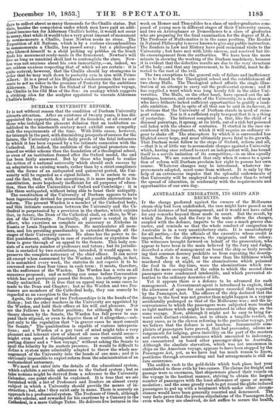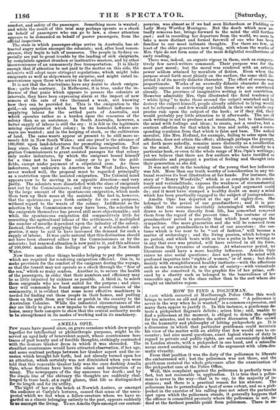.A.USTR A T.TAN EMIGRATION, ITS STUPS AND
RECRUITS.
Jr the charge preferred against the owners of the Melbourne steam-ship had been undefended, the case might have passed as an isolated instance of bad management, and it would not have called for any remarks beyond those made in court. But the result, by which the Bench and the Jury in the main affirm the charges, coupled with the defence, imparts to the case a much graver cha- racter, and reminds us that the whole conduct of emigration to Australia is in a very unsatisfactory state. It is unsatisfactory for all parties,—for the officials of the executive whose credit is impeached, for the shipowners, the emigrants, and the colony. The witnesses brought forward on behalf of the prosecution, who appear to have been in the main believed by the Jury and Judge, described a state of management on board the ship so truly revolt- ing that common decency prohibits us from repeating the descrip- tion. Suffice it to say, that far worse than the filthiness which murdered sleep at night, or the abominations which poisoned the food in the day-time were the abominations which ren- dered the mere occupation Of the cabin to which the second-class passengers were condemned intolerable, and which prevented at- tention to the ordinary decencies of life. Yet it appears there is a defence to be advanced for such management. A Government-agent is introduced to explain, that the allowance of space for each passenger exceeded that required by the Passengers Act. The officers of the ship declared that the damage to the food was not greater than might happen in a voyage accidentally prolonged as that of the Melbourne was ; and the in- conveniences to which the passengers were subjected were treated as light matters which might be encountered in other ships on the same voyage. Now, although it might not be easy to bring for- ward such distinct evidence, and to obtain a tangible verdict, in many cases, as in the eleven referring to the particular voyage, yet we believe that the defence is not baseless. Innumerable com- plaints of passengers have proved, that bad provender, odious ar- rangements for lodging, gross incivility on the part of the masters and stewards, and inconveniences which amounted to indecency, are encountered on board other passenger-ships to Australia. Although the absolute starvation, which was not uncommon in ships on the American voyage, appears to have been stopped by the Passengers Act, yet, as we have had too much reason to Inow, pestilence through overcrowding and bad arrangements is still na rare occurrence. The sudden rush to the gold-fields which took place last year contributed to these evils by two causes. The claims for freight and passage were so enormous' that shipowners placed their vessels on the voyage in the hastiest manner, striving to obtain the largest number of passengers with the least allowance of space or accom- modation; and the same greedy rush to get round the globe induced passengers to put up with a treatment which under other circum- stances would have been generally resented and denounced. The very facts prove that the precise stipulations of the Passengers Act, even 'when they are observed, do not suffice to secure the health,
comfort, and safety of the passenger. Something more is wanted ; and while the result of this trial may perhaps operate as a check on behalf of passengers who can go to law, a closer attention appears to be demanded on behalf of poorer passengers, from the official inspectors. The state in which passenger-ships arrive in Australia has at- tracted angry notice amongst the colonists ; and, after loud remon- strance, they begin to talk of measures. The people in Sydney es- pecially are put to great trouble by the landing of sick emigrants, by complaints against drunken or inattentive masters, and by other inconveniences of an unmannerly free transportation. It is likely enough that if attention be not paid to the matter on this side, the colonists will adopt more stringent regulations, which might take emigrants as well as shipowners by surprise, and might entail in- convenience upon those who arrive in the colony.
It is not that the Australians have any desire to cheek emigra- tion; quite the contrary. In Melbourne, it is true, under the in- fluence of that panic which appears to possess the colonists at intervals, they have been expressing alarm at the import of new eomers at the rate of two thousand a week, not knowing how they can be provided for. This is the emigration to the gold,—an emigration which has but an indirect influence in supplying labour for the settled parts of Australia, and which operates rather as a burden upon the resources of the colony than as an assistance. In South Australia, however, a better supply of labour is still the cry: it is felt in the legitimate mining operations of that colony ; in the household, where ser- vants are wanted ; and in the keeping of stook, or the cultivation of land. The same wants appear at present to be still more se- verely felt in New South Wales ; and one proof is the advance of 100,000/. upon land-debentures for promoting emigration. Not long sinee, the colony of New South Wales instructed the Emi- gration Commissioners to grant assisted passages for that colony only under indentures, by which the emigrant bound himself for a time not to leave the colony or to go to the gold- fields, except under payment of a stipulated sum. As these indentures, not unknown in America or the West Indies, have never worked well, the proposal must be regarded principally as a restriction upon the assisted emigration. The Colonial mind appears now to be moving in an opposite direction—and very justly. The colonists were dissatisfied with the class of emigrants sent out by the Commissioners ; and they were unduly impressed by the large amount of the spontaneous emigration, which made them turn up their noses at the assisted. The fact is, however, that the spontaneous goes forth entirely for its own purposes, without regard to the wants of the colony. Indifferent as the selection by the Commissioners may have been, the selection by the emigrants themselves has proved still more objectionable ; and whik the spontaneous emigration did comparatively little for recruiting the agricultural labour of the settlements, it multiplied the number of months dependent upon the industry of the colony. Instead, therefore, of supplying the place of a well-selected emi- gration, it may be said to have increased the demand for such a supply of labour. It was quite natural that this distinction should not have been observed either by the Commissioners or by the colonists; but renewed attention is now paid to it, and this advance of 100,000/. manifests the feelings of the people in New South Wales.
Now there are other things besides helping to pay the passage which are required for rendering emigration efficient. One is, to make provision for the comfort of the emigrant during the voyage, so that the transit may not operate as a check through the "fear of the sea," which so many confess. Another is, to secure the health of the passengers, in order that their numbers and efficiency may be as little impaired by sickness as possible. A third is, to select those emigrants who are best suited for the purpose ; and since they will commonly be found amongst the poorer classes of the community, it is evident that some more effective machinery is needed for finding out those people in their homes, and putting them on the path from any town or parish in the country to the Australian Colonies. While the industrial circumstances of the day are likely to give a new impulse to the emigrating instinct at home, many facts conspire to show.that the central authority needs to be strengthened in its modes of working and in its machinery.



































 Previous page
Previous page